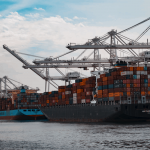5 Ways Technology Will Simplify Supply Chain Management
This is a guest post by Heather Redding.
 In today’s marketplace, there’s fierce competition, which is why businesses should devise smart ways to streamline the supply chain processes and enhance productivity.
In today’s marketplace, there’s fierce competition, which is why businesses should devise smart ways to streamline the supply chain processes and enhance productivity.
By using modern technologies, you can improve visibility in your supply chain. This will give you better control over the import or export side of your business and allow you to be ahead of the competitors.
Technology can help in simplifying the supply chain processes. Your company can run more efficiently, reduce operational costs, and provide more control and visibility over your business inventory.
Besides, through an efficient and stable supply chain, you can significantly improve customer satisfaction and retention.
Here are the top five ways modern tech could simplify supply chain management in your business:
1. Unmanned Aerial Vehicles (UAVs)
Currently, UAVs help logistics professionals to manage trailer yards and warehouses where several shipping containers require storing, tracking, and moving based on operational needs.
As UAVs fly, they may replace people working on the ground, touring the yards from above and confirming trailers’ exact locations. The vehicles also transmit other essential data while flying.
UAVs already carry out several functions in the supply chain, including acting as an extra set of eyes in a warehouse, spotting defects along gas and oil pipelines, and surveying remote areas.
UAVs also play a crucial role in the supply chain of the food and beverage industry: crop dusting fields.
On the fulfillment side of the supply chain, Amazon proposes using UAVs to deliver wares in rural areas, towns, and cities across the globe. Unmanned Aerial Vehicles have the potential to replace tons of railroad cars and trucks that currently transport cargo.
The technology will save consumers and companies time, money, and effort while allowing logistics firms to reach the farthest corners of the world.
2. Forecasting Future Scenarios
AI and machine learning keep learning as they interact with more data and have huge potential in impacting the supply chain. These technologies make it possible for organizations to gather data from different areas and analyze it for self-improvement.
Once AI and machine learning are integrated within the supply chain processes, they foster the automation of repetitive activities while delivering intelligence across various systems in the supply chain.
AI helps businesses overcome the scarcity of supply chain talent; the demand for supply chain professionals worldwide exceeds the supply by a ratio of 6 to 1.
What makes the matter worse is that the most experienced supply chain workers, with an age bracket of 55 to 75 years, retire at the rate of 10,000 per day.
AI facilitates the collection of knowledge, the amplification of complex decision-making, and the automation of repeated tasks. These capabilities simplify the transition of business expertise to Generation Z who are just getting into the supply chain and logistics profession.
Generation Z or digital natives grow up with access to everything digitally. They expect their workplace to be as AI-empowered as their personal lives. Thus, for companies to attract the best Generation Z talent, they should adopt AI and other advanced technologies.
3. Automation
Automating systems and processes along the supply chain can make work efficient. For most life science organizations, collecting and maintaining supplier data typically means handling data manually using paperwork or a semi-electronic system, and not updating the data often.
In supply chain operations, automated systems like radio-frequency identification (RFID) and robotics can free up supply chain professionals’ time, so they shift their focus from mundane tasks to other valuable roles in the organizations.
The outcome is reduced operational costs and improved productivity.
Investing in suitable tools and resources can considerably reduce the operational expenses in the long-term.
Information Services Group (ISG) conducted a study that showed that the use of robotics to automate processes within the supply chain led to a 43% decrease in resources for processes such as credit, pricing, billing, and collections.
Besides, a report by McKinsey states that automation could increase the global economy’s productivity by 0.8% to 1.4% of the global GDP yearly. In other words, automating the supply chain is not only cost-efficient, but it also results in increased profitability.
The supply chain processes that may adopt automation include:
- Payments and invoicing
- Packing and picking
- Inventory and order fulfillment updates
- Setting and tracking of revenue
- Selling across several channels
- Executing bulky actions for fast-moving products
- Customer services, such as email confirmation and tracking generation
By automating all these tasks, consider the extra time you’ll have to concentrate on growing your business instead of worrying about the import/export aspects of it.
4. Advanced Analytics
Modern technologies that are revolutionizing entire industries, such as machine learning, artificial intelligence, and the Internet of Things, can help gather vast amounts of data and analyze the data effectively.
The data from these technologies keeps growing exponentially, but it’s often incomplete, disorganized, and unstructured.
The vast supply chain data gathered isn’t of much use if an organization can’t analyze and leverage it quickly and intelligently. That’s where advanced chain analytics comes into the picture; it makes supply chain data more useful and delivers significant benefits.
The analytics provide massive insights into people, products, and processes, thus enabling leaders in the supply chain industry to make quality decisions to make the business and operations better.
Specific areas where data analytics are useful include predictive maintenance and the planning of supply and demand.
5. Greater Security
With technological advancements comes greater privacy protection, which allows organizations to provide a guarantee about the information they receive. Supply chain providers can deploy elaborate security practices to their operations.
Security fosters privacy, which is critical when forging business relationships and when tracking and managing the route of moving cargo.
This level of interconnectedness allows both parties to carry out security monitoring without compromising the accuracy and speed of business practices.
Final Word
Technology continues to play a vital role in the global supply chain.
By embracing the latest technologies, you will lower operational costs and automate most business processes so you can focus on other essential aspects of your business and add value to the bottom line.
This was a guest post by Heather Redding.
Author Bio
Heather Redding is a content manager for rent, hailing from Aurora. She loves to geek out writing about wearables, IoT and other hot tech trends. When she finds the time to detach from her keyboard, she enjoys her Kindle library and a hot coffee. Reach out to her on Twitter.




